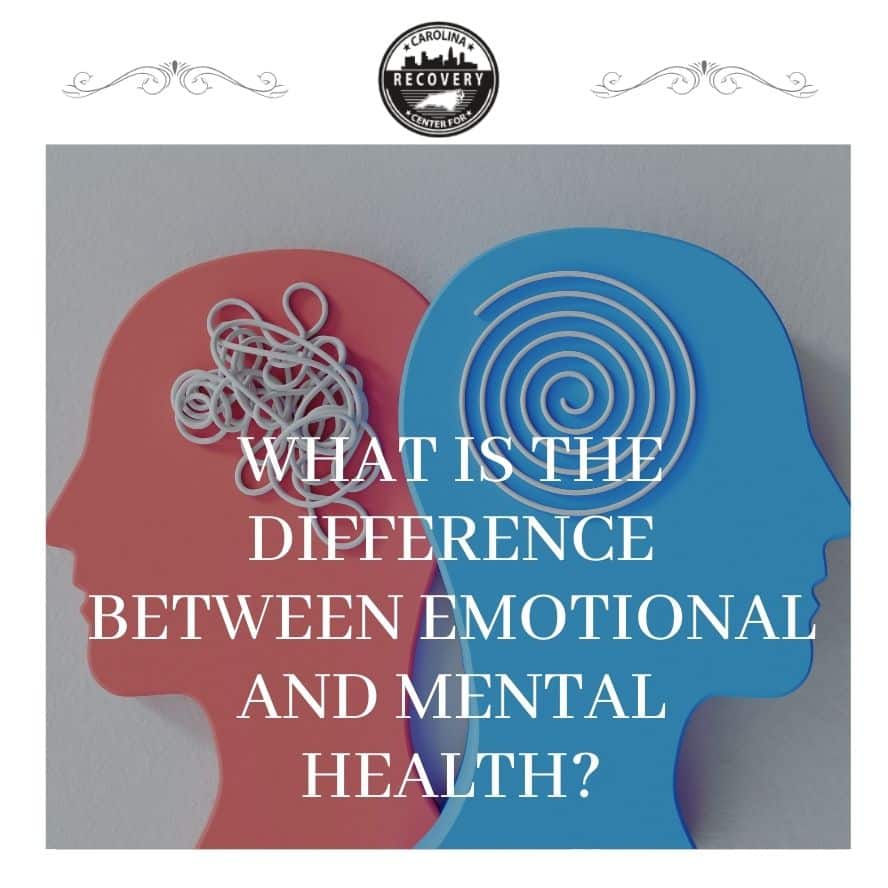What is the Difference Between Emotional Health and Mental Health?

Medically Verified: 2/1/24
Medical Reviewer
Chief Editor

All of the information on this page has been reviewed and verified by a certified addiction professional.
Many people use the terms emotional health and mental health interchangeably, but these terms do not mean the same thing. Understanding their differences can help you improve your overall mental and emotional well-being.
This article will explore the differences between emotional health and mental health. You will learn how to identify problems in your emotional and mental well-being, learn strategies to improve both, and discover how to seek the support and treatment you need to overcome substance abuse and addiction or mental health challenges.
Reach out to the Carolina Center for Recovery team now to explore our holistic substance abuse treatment programs or to find support at any stage of your addiction recovery journey.
What is the Difference Between Mental Health and Emotional Health?
Some mental health experts like using the image of ways on the ocean to help people differentiate between mental and emotional health. Think about mental health as the sea, which is broad and deep. On the other hand, emotional health is like waves that fluctuate on the surface. The ocean and waves are connected but have very different qualities.
In this way, emotional health and mental health are linked but defined by different characteristics. Mental health describes our ability to process the information we encounter daily and across our lifespan. Emotional health relates to the feelings we experience while processing this information.
Understanding the differences between emotional health and mental health can help you identify problems, work towards solutions, and restore the balance in your well-being.
What is Mental Health?
Mental health relates to our beliefs, thoughts, and how we process our experiences. Mental health is also measured by how well we manage stress and be resilient in facing challenges.
When people have good mental health, they can maintain healthy relationships, be productive at work or in school, and use good judgment to make decisions that align with their values and goals. People with good mental health can handle stressful situations without relying on unhealthy coping mechanisms.
Some mental health specialists like to think of mental health as our “hardware” because it describes the functioning of our brain. When a person’s mental health is compromised, they may struggle to get along with others, make decisions, or cope with stress.
Mental health challenges affect people’s ability to function. These problems may be related to:
- Genetics
- Family history
- Trauma
- Brain chemistry
Improving mental health may require solutions that address the complex underlying roots of mental illness. In many cases, people require comprehensive treatment, including therapy, group support, medications, and lifestyle changes.
What is Emotional Health?
If mental health can be described as our hardware, emotional health would be our software. Emotional health is sometimes called “emotional well-being.” It represents our ability to manage our emotions in a positive, healthy way. Good emotional health means being able to identify a range of complex emotions and cope with them in a way that aligns with our goals for the future and values.
Some aspects of emotional health include:
- Having an awareness of your emotions
- Accepting your feelings without judgment
- Managing and processing your emotions
- The ability to appropriately express your feelings
Good emotional health requires emotional intelligence and the ability to regulate your emotions.
How Can You Improve Mental Health and Emotional Health?
There are many physical, emotional, and behavioral symptoms that may suggest your mental and emotional health need some attention. Here are some of the signs of poor mental health or emotional health:
- Physical aches, pains, and tension that have no apparent cause
- Erratic or unpredictable mood swings
- Substance abuse
- Interpersonal conflicts
- Excessive or chronic worrying
- Negative emotions like fear, anger, and helplessness
- Difficulty taking care of everyday tasks
- Preoccupation with death or dying
- Thoughts of self-harm or suicide
People with poor mental health may be at increased risk of developing substance abuse or addiction, which can exacerbate mental and emotional health problems.
Here are some things you can do to improve your emotional health and mental health:
- Open up about your experiences and feelings
- Develop and follow a self-care routine that includes regular healthy meals, rest, and socialization
- Stay active by incorporating exercise into your daily routine
- Practice meditation or other forms of mindfulness
- Eat a healthy diet that includes whole grains, lean meats, healthy fats, and plenty of fruits and vegetables
- Prioritize sleep
- Limit stress as much as possible
- Spend time with supportive friends and loved ones
- Set achievable goals and work toward them
Self-care can be critical to improving your mental health, but you must seek professional treatment if symptoms last a long time or interfere with your ability to function.
Get Help Now
Poor mental and emotional health can keep you from living the healthy, fulfilling lifestyle you deserve and put you at risk for substance abuse and addiction. If you or someone you love needs support to improve your emotional or mental health, or you want to learn more about holistic dual diagnosis treatment, contact the Carolina Center for Recovery specialists now.

